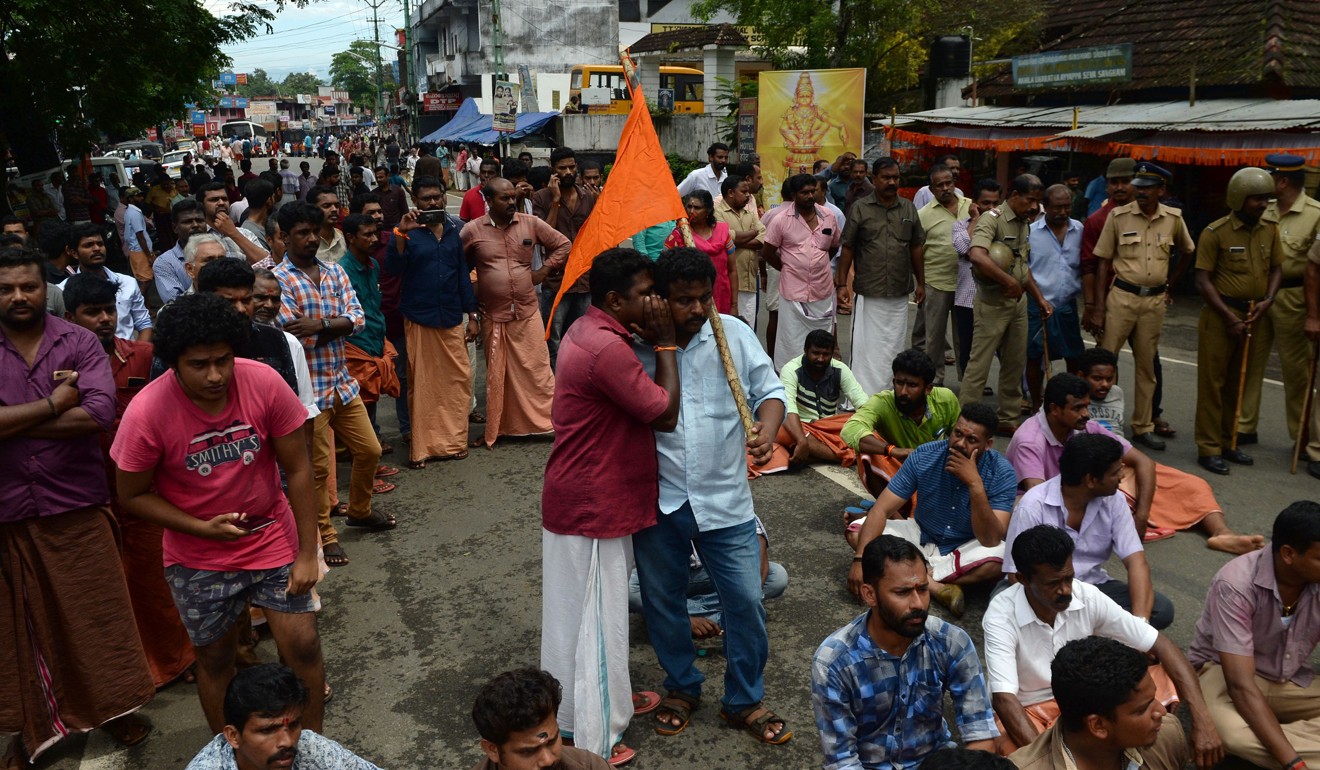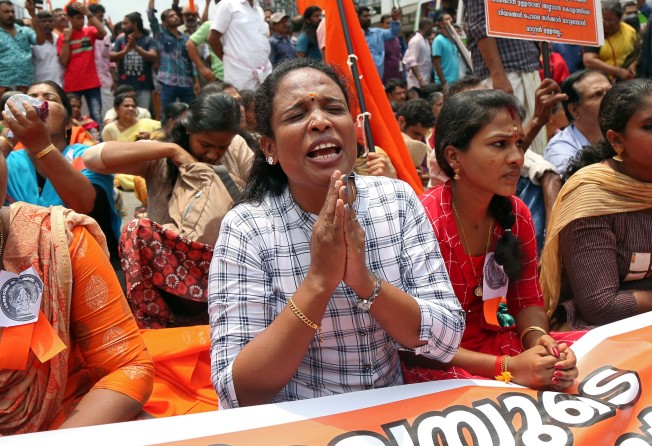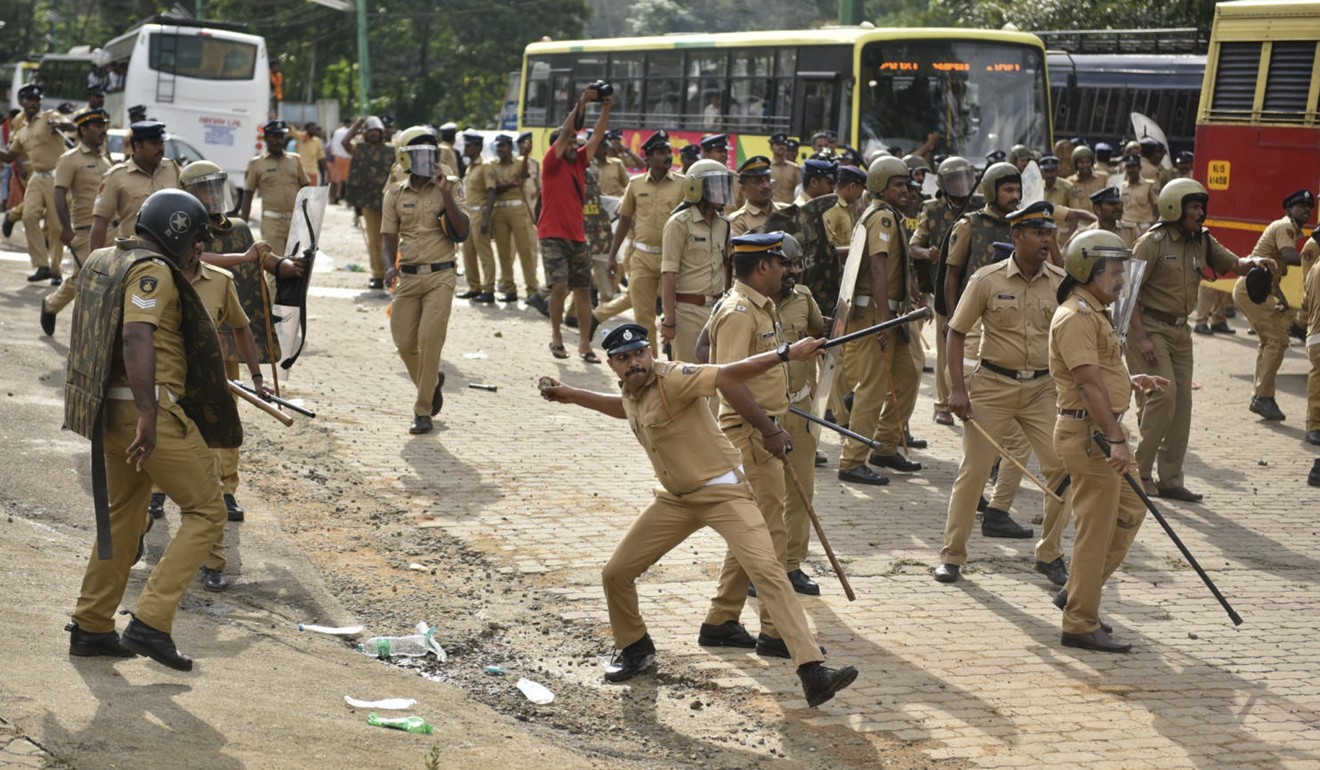
Sabarimala temple protests: what does Indian PM Modi have to fear from menstruating women?
- One of the world’s largest Hindu pilgrimage sites has allowed women of menstruating age to enter its grounds after a Supreme Court decision
- But fierce protests have broken out and the ruling BJP party has spotted an opportunity to win favour before next year’s elections

Indian Prime Minister Narendra Modi’s Bharatiya Janata Party (BJP) is wading into troubled waters in Kerala, where conservative protesters are blocking women of menstruating age from entering Sabarimala temple, one of the world’s largest Hindu pilgrimage sites, as it prepares to open for the season on Friday.
The BJP, which failed to win even a single one of the state’s 20 parliamentary seats in the 2014 election, hopes to do better in next year’s polls by supporting the agitators, thousands of whom have been detained by the Kerala state government.
“Today in Kerala a struggle is going on between religious beliefs and state government’s cruelty. More than 2,000 activists and workers from BJP, RSS [BJP parent organisation Rashtriya Swayamsevak Sangh] and other organisations have been arrested. BJP is standing like a rock with devotees, Left government be warned,” BJP president Amit Shah said at a rally last month, according to a report from local news site NDTV.
The BJP is not alone, as even the opposition Indian National Congress – which was defeated in the 2014 elections – is supporting the orthodox Brahmins who are determined to oppose women’s entry into the shrine, whatever the cost. Other opposition parties are also hoping to profit from the agitation.
Women between the ages of 10 and 50 have been denied entry into the temple for years. The informal ban became law in 1972, and the Kerala High Court confirmed it, until it was struck down by India’s Supreme Court in September.
Chief Justice Dipak Misra said the selective ban on women was not an “essential part” of Hinduism, and instead a form of “religious patriarchy”.

The decision sparked anger from protesters, who claim the allowing women to enter the grounds would offend with the celibate nature of the temple’s presiding deity, Ayyappan.
The Sabarimala temple is considered to be one of the holiest in Hinduism, and is visited by between 17 million and 30 million devotees each year. Some estimates even put the number of annual visitors as high as 50 million.
Kerala chief minister Pinarayi Bijayan had earlier said the government would implement the Supreme Court decision, though he did not make it clear how – leading to speculation that women might even be airlifted into the temple by helicopters, over the heads of the protesters below.
However, after a petition against its earlier order, the Supreme Court will on January 22 review its decision to allow women into the shrine. Both BJP and the Congress have advised the Kerala government to wait for the final decision before taking further action.
The temple opens on Friday for the start of the 62-day pilgrimage season. Trupti Desai, a female activist, has asked for complete police protection during her visit. She told The Hindu newspaper her group, which includes six other women, was under threat from “functionaries of the RSS, BJP, the Congress and devotees of Lord Ayappa”.
Desai said she did not wish to hurt anyone’s sentiments, but was determined to stay until she succeeded in offering worship.
“Ever since I announced my decision to visit the temple, I have been bombarded with a continuous stream of death threats and expletives. Some of them are especially gory and graphic in nature, warning us that our limbs will be hacked if we dared to land in Kerala,” she told the newspaper.

But since the Supreme Court has not stayed its earlier ruling – meaning women are legally allowed to enter the temple until the final decision in January – it remains to be seen how the situation develops in the coming days. The women, aided by their supporters, could yet force their way past the protesters.
The BJP is focusing on Kerala as it aims to raise its tally of seats to 400 in the Lok Sabha, the lower house of India’s parliament, after the upcoming general election to be held by next May. In 2014, the party won 282 out of 543 seats, but by forming a coalition, Prime Minister Narendra Modi raised the tally of seats in his government to 336.
The BJP is determined to turn the tide in its favour though of late, there has been unhappiness towards the government.
The key battlegrounds will include Kerala, as well as other states in which it fared poorly last time out, such as Andhra Pradesh, Karnataka and Tamil Nadu.